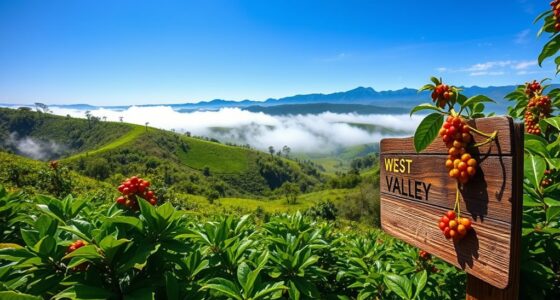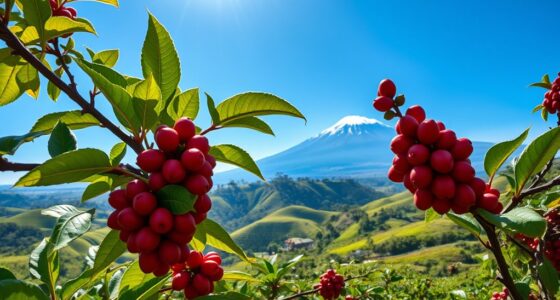Yemeni Mocha coffee has ancient roots tied to the highlands of Yemen, where traditional farming methods and rugged terrain shaped its unique flavor. It once served as a key hub along trade routes, making it a symbol of luxury and wealth worldwide. These historic practices, along with organic cultivation, preserve its distinctive qualities today. To discover more about how Yemen’s rich history influences Mocha coffee’s timeless appeal, keep exploring its fascinating story.
Key Takeaways
- Yemeni Mocha coffee originates from traditional cultivation in Yemen’s highlands, using organic methods passed down through generations.
- Its unique flavor is shaped by Yemen’s volcanic soil and rugged terrain, critical to Arabica bean development.
- Historically, Yemen’s strategic location made it a key port along ancient trade routes, spreading Mocha coffee globally.
- Mocha became a symbol of luxury and sophistication as it traveled along trade networks to the Middle East, Europe, and beyond.
- Modern practices emphasize sustainable, organic farming that preserves Yemen’s rich cultural heritage and the coffee’s distinctive qualities.

Have you ever wondered what makes Yemeni Mocha Coffee so special? It’s more than just a flavorful brew; it’s a product rooted in centuries of history and tradition. The story begins with coffee cultivation in Yemen, where the highlands provide an ideal climate for growing Arabica beans. The rugged terrain and volcanic soil create perfect conditions for cultivating this prized coffee, and Yemeni farmers have perfected their methods over generations. Unlike many modern coffee plantations, Yemen’s coffee cultivation remains largely traditional, often done on small farms where farmers harvest beans by hand. This careful process ensures the beans develop their complex flavors, which are renowned worldwide. The distinct taste of Yemeni Mocha coffee isn’t just about the beans – it’s about the entire journey from farm to cup, a process steeped in history and culture. Additionally, the unique organic farming methods used in Yemen help preserve the flavor quality of the coffee, contributing to its reputation. The traditional farming practices employed are vital in maintaining the integrity of the coffee’s flavor profile, and they are often passed down through generations. But what truly sets Yemeni Mocha apart is its deep-rooted connection to the trade route history. Yemen’s strategic location made it a crucial hub in ancient trade networks, especially along the famous Red Sea route. Traders from Africa, Arabia, and Asia used Yemen as a gateway, facilitating the exchange of goods, ideas, and cultures. Coffee was one of these treasured commodities, and Yemen quickly became the original source of the beloved beverage. The city of Mocha, in particular, grew into a bustling port where coffee beans were exported across the Middle East, Europe, and beyond. These trade routes helped spread the coffee’s popularity, turning Yemeni Mocha into a symbol of luxury and sophistication. The trade route history not only contributed to Yemen’s economic development but also preserved the unique methods of coffee cultivation that give Yemeni Mocha its distinctive flavor profile. As you savor a cup of Yemeni Mocha coffee, you’re tasting more than just rich, complex flavors; you’re experiencing a centuries-old legacy. The centuries-old trade routes ensured that Yemeni coffee reached distant lands, carrying with it stories of traders, explorers, and cultural exchange. This history of trade and cultivation intertwines, making every sip a connection to a past that shaped the global coffee industry. Yemen’s rugged mountains and ancient ports are more than scenic backdrops; they are the birthplace of a tradition that continues today. So, the next time you enjoy Yemeni Mocha, remember that you’re participating in an ongoing story of exploration, trade, and cultural preservation that has lasted for hundreds of years. Moreover, understanding the organic farming techniques used in Yemen highlights the importance of sustainable practices in maintaining the coffee’s unique qualities.
Frequently Asked Questions
How Did Yemeni Mocha Become a Symbol of Luxury?
You might wonder how Yemeni Mocha became a symbol of luxury. It’s because of its rich history and unique cultural symbolism, which have elevated its status in luxury branding. As a rare and prized coffee, its deep, complex flavor appeals to connoisseurs. Over time, its association with exclusivity and tradition has solidified its place as a luxurious product, making it a coveted symbol of sophistication and elegance worldwide.
What Are the Unique Flavor Notes of Yemeni Mocha Coffee?
You’ll notice that Yemeni Mocha coffee has a rich flavor profile, offering complex tasting notes like hints of chocolate, spice, and dried fruit. Its unique flavor comes from traditional processing methods and the high-altitude growth. When you sip it, you’ll experience a deep, robust body with a slightly fruity and smoky undertone, making it stand out among other coffees. Its distinctive tasting notes truly make it a luxurious, memorable brew.
How Has Climate Change Affected Yemeni Coffee Cultivation?
Imagine your favorite coffee fading away—climate impacts have made that a reality for Yemeni farmers. Rising temperatures and unpredictable rainfall create cultivation challenges, causing crop yields to decline and threatening traditional practices. You might not see it daily, but climate change disrupts the delicate balance needed for Yemeni coffee to thrive. It’s a stark reminder that shifting weather patterns directly threaten this historic, cherished crop.
Are There Traditional Yemeni Coffee Preparation Methods?
You’ll find that traditional Yemeni coffee preparation involves a rich coffee ceremony where you carefully perform traditional roasting, bringing out unique flavors. During the ceremony, you often grind the beans fresh and brew the coffee in a dallah or jebena, emphasizing hospitality and ritual. These methods preserve cultural heritage and create an authentic experience, connecting you with Yemen’s deep-rooted coffee traditions passed down through generations.
What Is the Current Global Demand for Yemeni Mocha Coffee?
The demand for Yemeni Mocha coffee is skyrocketing like a rocket to the stars. You’ll find that market trends show increasing global interest, especially among specialty coffee enthusiasts. Export statistics reveal steady growth despite challenges. This unique coffee’s rich history and distinctive flavor make it highly prized worldwide. As more people seek authentic experiences, Yemeni Mocha’s popularity continues climbing, ensuring its place in the global coffee scene for years to come.
Conclusion
So, next time you savor that rich, chocolatey mocha, remember it all started in Yemen’s ancient lands. The very birthplace of coffee’s journey to global fame, yet today, Yemen struggles to keep that legacy alive amid turmoil. Ironically, a brew that once fueled empires now faces uncertain futures. Your cup connects you to centuries of history—reminding us how something so simple can carry such profound stories of resilience and loss.









